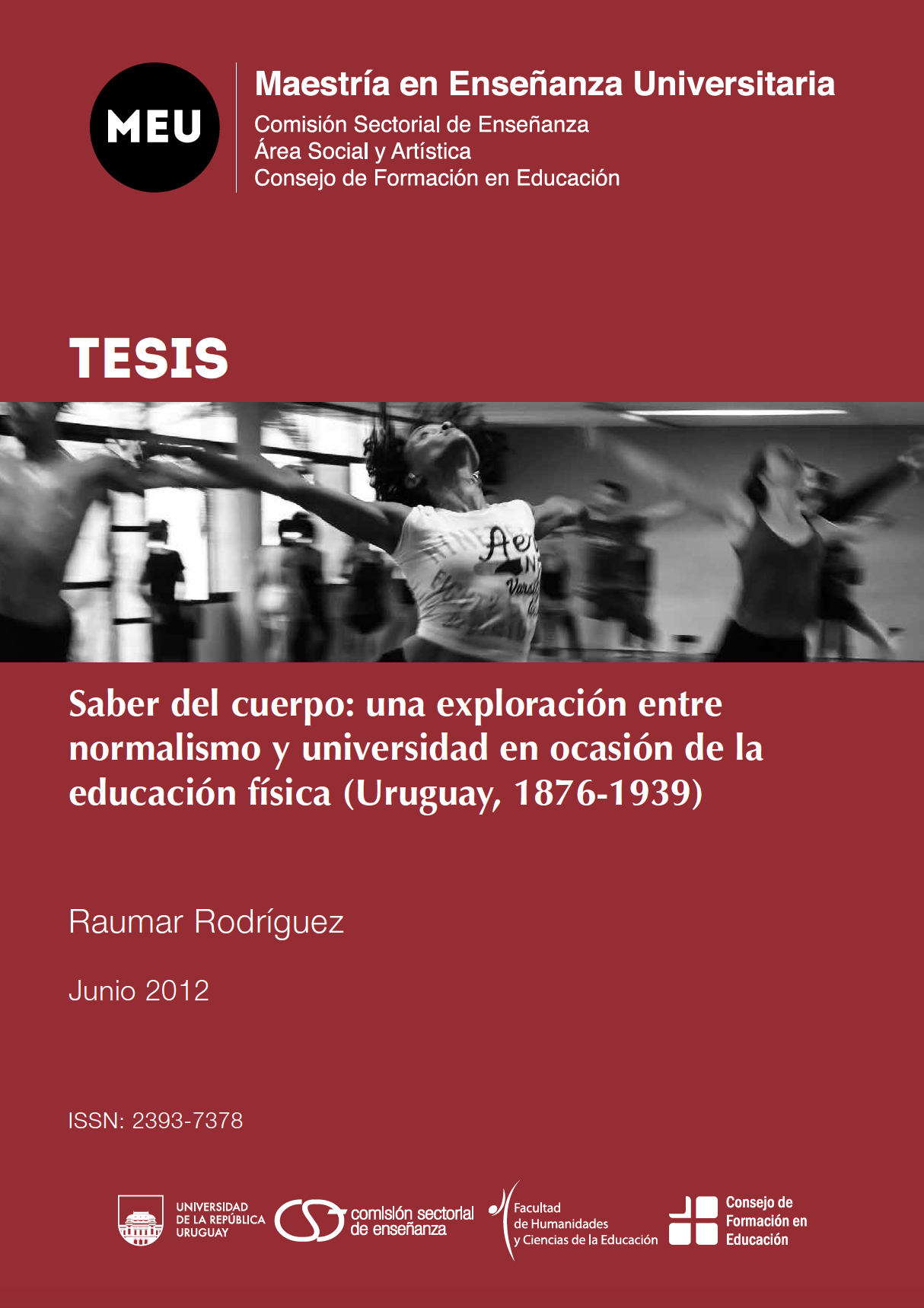Resumen
Esta tesis es el resultado de una investigación sobre el saber del cuerpo en la tradición normalista y la universitaria en el Uruguay, entre 1876 y 1939. Montada sobre estas dos tradiciones, se constituye la formación de profesores de educación física.
Se procuró identificar elementos que han configurado un campo de saberes específicos destinados a la educación y enseñanza del cuerpo, explorando las diferencias y la especificidad de cada tradición. Se ha indagado también en el efecto del discurso científico sobre el conjunto de conceptos, prescripciones y prácticas que constituye la educación del cuerpo y se ha procurado sostener ciertos límites conceptuales que distinguen lo pedagógico, lo didáctico y lo epistémico. Tras ese recorrido se analiza el proceso de conformación del profesorado en educación física. Finalmente, la indagación da lugar a dos grandes discusiones: la relación entre pedagogía y biopolítica, y la cuestión del saber del
cuerpo.La metodología utilizada reúne dos modalidades: arqueología y análisis del discurso. Se ha realizado acopio de un conjunto de documentos, se han clasificado e identificado rasgos que hacen a la matriz discursiva del campo, con el propósito de captar la materialidad de ese discurso específico que establece la relación cuerpo-educación- enseñanza.
El recorrido realizado por las tradiciones normalista y universitaria, muestra claramente que nos son discursivamente “puras”. Cada una contiene elementos de la otra. Sin embargo, se puede indicar alguna especificidad: del lado de la tradición normalista, la preocupación gubernamental es quizás uno de sus rasgos sobresalientes; del lado universitario, la preocupación por el saber o la ciencia. La educación física procede de lo político-pedagógico más que de lo científico. Por esta razón le resulta esquivo el saber: su historia es la historia del ejercicio físico, del adiestramiento corporal, del acondicionamiento físico, de la preparación anátomo-fisiológica para el desarrollo intelectual, del desarrollo y mantenimiento del organismo.
Con esta investigación se pretende aportar en dos sentidos: en primer lugar, se contribuye a comprender los límites y los puentes de comunicación entre dos tradiciones, en términos de saber del cuerpo. Luego, a partir de esta distinción, se contribuye a la discusión actual sobre el ámbito de formación del profesor de educación física o, más ampliamente, sobre el ámbito de formación en un campo de saber en ciernes que se puede denominar “educación del cuerpo”.
Palabras claves
cuerpo, educación, enseñanza, universidad, normalismo
Abstract
This thesis is the result of an investigation into the knowledge of the body in the normal and the university tradition in Uruguay, between 1876 and 1939. Mounted on these two traditions, the training of physical education teachers is constituted.
It was intended to identify elements that had set a specific field of knowledge for education and teaching of the body, exploring the differences and the specificity of each tradition. It was also investigated the effect of the scientific speech on the group of concepts, indications and practices that constitute the education of the body and it was intended to maintain certain conceptual limits that distinguish the pedagogic from the didactic and the epistemic. After this, the process of conformation of the physical education teacher is analyzed. Finally, the investigation gives place to two big discussions: the relationship between pedagogy and biopolitics, and the issue of the knowledge of the body.
The methodology used combines two modalities: archeology and analysis of the speech. A group of documents has been gathered, also the classification and identification of features that make the discursive matrix of the field has been made in order to capture the materiality of that specific speech that sets the relation body-education-teaching.
The route taken by the normal tradition and the university tradition, show clearly that they are not discursively “pure”. Each of them contains elements of the other one. However, it is possible to identify certain specificities: on the one hand, referring to the normal tradition, the governmental concern is probably one of the highlighted issues; on the other hand, the university tradition concern is about knowledge and science. Physical education proceeds from the political-pedagogy more than scientific. That is why, it founds that knowledge can be elusive: its history is the history of the physical exercise, of the corporal training, the physical conditioning, the preparation anatomic-physiological for the intellectual development, the development and maintenance of the organism.
The aim of this investigation is to contribute in two ways: in first place, it contributes to understand the limits and bridging communication gaps between these two traditions, related to the knowledge of the body terms. Then, because of this distinction, it contributes to the present discussion about the ambit in which a physical teacher is formed or, widely talking, about the ambit of formation in a field of knowledge, that at first can be named “education of the body”.
Keywords
body, education, university, teaching, normalism
Director(es) de tesis
- Luis Behares
Tribunal
- Alexandre Fernandez Vaz
- Carlos Demasi
- Luis Behares
Fecha de Aprobación
19/07/2012
Dictamen
Aprobado con mención

